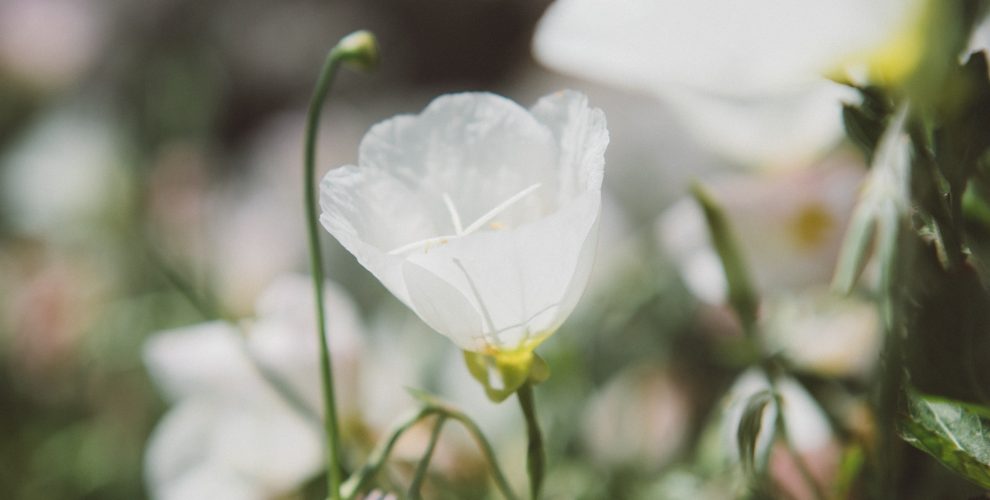When we talk about the environment, it can be hard to find the right tone. It’s easy to be angry and scared, to feel somewhat hopeless about the whole thing. However, this isn’t always the easiest way to get new people on board with the cause, especially those that currently don’t care. One of the biggest problems we face for mitigating climate change is apathy and, if people have a natural tendency to turn away from the truth when it makes them feel overwhelmed or ashamed, then perhaps we need to look at other ways to bring them into the fold.
Recently my friend Holly from Leotie Lovely talked about a change in direction in her writing, moving towards tales of optimism and enchantment to invite people to imagine a better future, and motivate them to work for it. I think this is a good idea. Don’t get me wrong, people still should be angry and demanding change. But what if this anger could spur us to radical hope? That our rightful indignation with the treatment of our planet could drive us to push harder because we also truly believe we could find the alternatives if we put the work in?
I think one way to combat hopelessness is to combat isolation in all its forms, instead fostering connectivity, community building, and cooperation to find both systemic and small scale solutions. Neil Gaiman has a talk that I quote constantly, in which he discusses the power of story. As young children, stories are the first places where we learn to build empathy, as we put ourselves into the places of the characters we read about. Empathy is a route to understanding identity and connection, which are key to a more conscious future.

‘Empathy is a tool for building people into groups, for allowing us to function as more than self-obsessed individuals’
To work collaboratively, we have to think connectedly. This has to begin with our inner worlds. Recently, when attending a workshop on the subject run by The Mindful Kitchen, I learned about a subject called nature relatedness. I feel like it could be a good place to start.
What is Nature Relatedness?
When we think about the relationship between humans and nature, many of us see these as two separate things. We might go out into the world to ‘reconnect’ with nature now and again, but this ultimately suggests that as a species we are inherently separate from it. That nature is something that sits outside of us, which we leave behind when we go home.
The concept of nature relatedness, which is rooted in a body of peer-reviewed research, suggests a different story. Instead of seeing ourselves as outside of nature, we can see ourselves as an equal part of nature. It isn’t something in the far distance that we connect to occasionally, it’s part of us and all around us, all the time. When we cultivate a nature related identity, we feel a bond with all forms of life.
As your inner narrative shifts, your perspective shifts. When your perspective shifts, you start asking new questions and trying new experiences. If they feel good, those adventures become habits and eventually your behaviour begins to align with your new identity.
This identity has been lacking in many of us, both individually and systemically. We’ve seen our human world (‘civilisation’) and the natural world (‘the middle of nowhere’) as different and separate things. We think we’re just visiting nature from time to time, but this isn’t the real story. Everything that keeps us alive: the air we breathe, the water we drink, the food we eat, are all clear demonstrations of our constant exchange with the rest of the natural world. They are all the result of countless natural systems working together in harmony to sustain us, as well as all other forms of life. Nature is a web, we are part of that web alongside all other living things, we aren’t separate or superior to it.
If we want to understand this kind of mindset, I would argue that most Indigenous communities around the world have held on to a truer narrative and understanding of nature, as opposed to those of us who are descended from a colonialist past of stealing and destroying. Just as Indigenous communities understand their land better and have developed traditions of living in harmony within their surroundings (hence why their voices should be key when it comes to conservation), cultivating a greater understanding of how nature and humanity can relate to each other, can help us to think more consciously. In turn, this has the power to shift our society’s systems to respect and protect nature properly.

Nature relatedness researchers developed a scale that measures how nature related your identity currently is. Over time, if you engage in activities designed to up your nature relatedness, multiple benefits have been found to emerge. Stress and anxiety decrease whilst creativity, empathy and mental wellbeing increases. At the same time, we also begin to behave in more eco-friendly ways because, when we see ourselves as nature, human health and planetary health become inseparable.
Essentially, cultivating a nature relatedness practice improves our health, while simultaneously driving us to care for the planet and behave in more eco-conscious ways, as we understand our identity as part of the nature around us.
How can The Mindful Kitchen help?
The Mindful Kitchen was founded by Heather Thomas and Marian Reed. The pair taught workshops in Copenhagen, educating people on the big picture changes needed to create regenerative agricultural systems, alongside the smaller cookery skills needed to shift to a more conscious way of eating. They felt there was more to be done, however, because if combating climate change was as simple as sharing tips for individuals to solve everything, there would be no problems to deal with. There had to be a way to help more people act on their intentions to live in greener ways.
While researching this, Heather had the chance to train in climate change communication with Al Gore and the Climate Reality Project. She realised that, because climate change is a human problem, we need to look at why we humans behave the way we do to find solutions. She discovered nature relatedness soon after, and The Mindful Kitchen was created with the aim of helping people build a nature relatedness practice through something universal: food.

Food lies at the intersection of social, economic and environmental justice, it’s something that we all need in order to stay alive and, for many of us, it is the most tangible recurring exchange we have with nature. The Mindful Kitchen exists to help people begin to shift their understanding of their identity through their understanding of food, so they begin to identify more as a part of nature, not separate from it.
Building a nature relatedness practice through food means learning to weave together certain skills, namely ‘storytelling’ to build new perspectives, ‘beginner’s mind’ to build new knowledge, and ‘rituals’ to build new meaning. These methods help us utilise our perspectives of what we eat, in order to become more aware and respectful of how the natural world supports us (from the soil, the water, the sun and more, every natural element in the ecosystem that comes together to create the food we consume).
To support people in developing this awareness and perspective, The Mindful Kitchen run nature relatedness food workshops, one of which I was lucky enough to attend earlier this year. Beyond this, they’re also releasing a book this year filled with recipes that help us foster a sense of connection to nature and celebration in the process of making them, and they are working on a digital membership programme. The programme will help members set nature related goals to build personal wellbeing, provide clear methods for fostering nature relatedness, and celebrate progress along the way. It will help create a clear plan to forming new habits, and will be created through collaboration with Dr Elisabeth Nisbet of Trent University to adapt the existing Nature Relatedness Psychometric Test.
Start with Storytelling, that will give you knowledge and insights. Then use the Beginner’s Mind question to expand how you think about the topic at hand and question what you think you know. From there, move on to the Ritual which lets you practice what you have learned through your hands and your body in the shape of a recipe or a simple routine you can incorporate into your daily life.
Then do it again.
As someone who scores highly on the nature relatedness scale (4.67/5, the average score is 3.28), I can attest to the benefits I’ve seen in my personal wellbeing as I’ve made steps in my own life to nurture this perspective. But, beyond the personal benefits, by utilising nature relatedness we also have the chance to shift from a hierarchical model of sustainability, where humans are superior to everything else, to a model of regeneration, where life forms are equal and nature is in control. The digital membership will help anyone who joins to develop their nature relatedness practice on a personal level, but it also holds to power to help humanity shift to new models of conscious behaviour, collaboration and connectedness, simply by learning to rewrite the stories we tell about ourselves and the world around us. I believe this is what we need in order to shift humanity to action, and away from apathy, and I’m glad that there are organisations like The Mindful Kitchen that are here to support us on the journey.






3 Comments